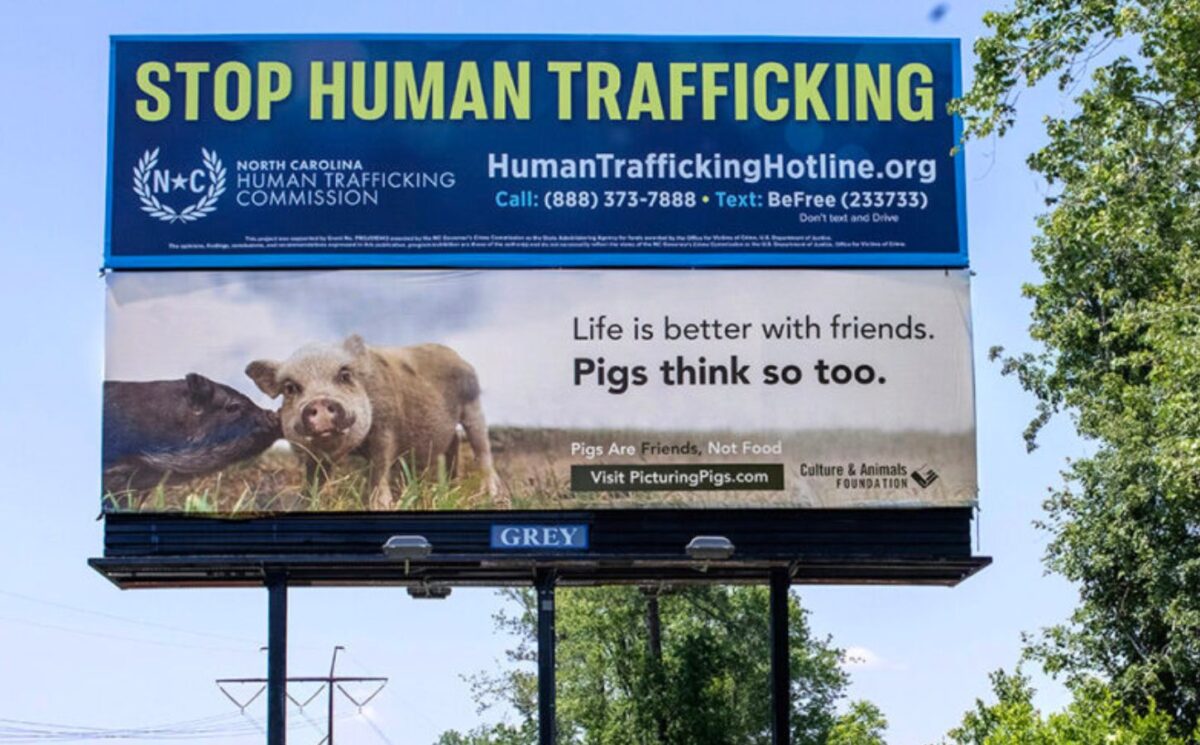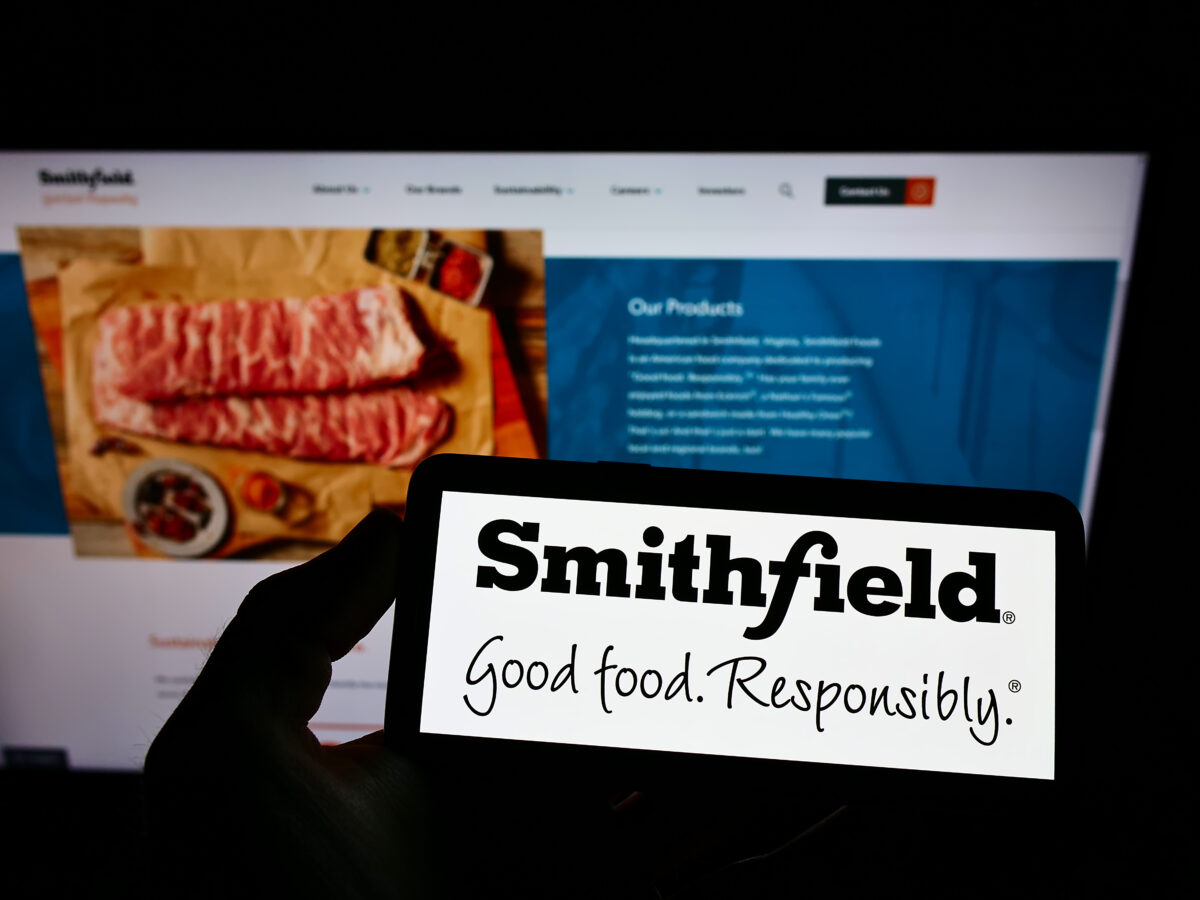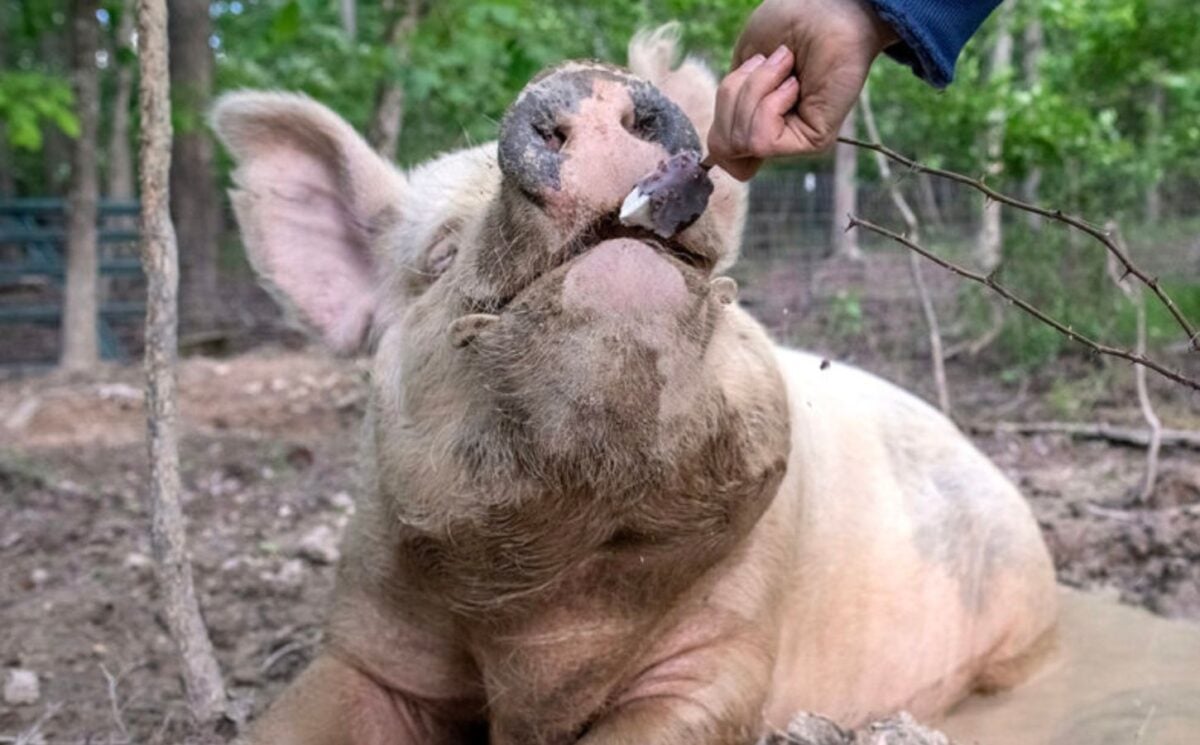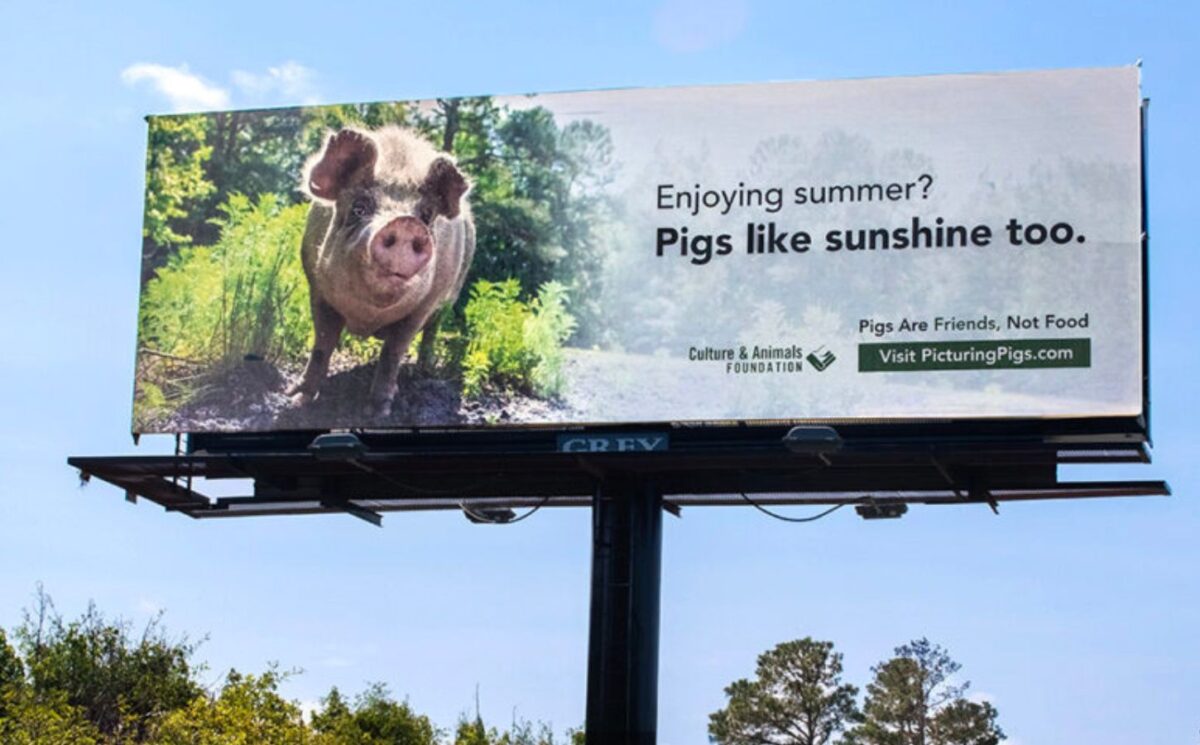North Carolina (NC) is home to around eight million pigs. It’s the third largest pork producing state in the US. As the NC Pork Council proclaims, it has more than 450 barbecue restaurants with pig meat on the menu.
The residents of NC might eat the pigs, smell their waste, and be made sick from the pollution the waste causes. But they may never actually see the animals, who are hidden from view inside the state’s many factory farms.
To try to make the invisible animals visible, two photographers decided to show that pigs are not just food, but feeling creatures. Mary Shannon Johnstone and Jane M Casteline took pictures of rescued pigs, intending to put the images up on billboards in NC, a project they called “Picturing Pigs.”
But finding a home for those innocuous images proved rather difficult in a state where farming and killing pigs is a USD $10 billion industry.
“Pigs are friends”

Johnstone and Casteline, who met at Wake County Animal Center in NC where they were volunteering in 2015, created two billboard posters. One shows Iris and Brianne, bonded sisters who live at Blind Spot Animal Sanctuary, with the caption: “Life is better with friends. Pigs think so too.”
The second features Daisy, who has lived at Sisu Animal Refuge since 2019, and reads: “Enjoying summer? Pigs like sunshine too.” Both posters bear the words, “Pigs Are Friends. Not Food.” The posters are up on billboards beside the I-40 highway that runs through Duplin county and Sampson county in NC.
While the pig farms generally aren’t visible from the road, trucks transporting them often travel on the I-40. Johnstone and Casetline think that people in NC are “aware” of the factory farms and the trucks, “but try not to think about it.”
Until recently, NC had some of the most restrictive “ag-gag” laws in the US, criminalizing whistleblowing in agricultural facilities. Under these laws, anyone who took footage inside a farm building, even if it was of serious animal abuse, would be punished.
But in February 2023, the US Court of Appeals struck down the law for being unconstitutional. In October, the Supreme Court declined to review the decision, meaning the ruling of unconstitutionality still stands.
Don’t look at the pigs
Getting the billboards up took a lot of persistence. Johnstone and Casteline initially signed a contract with Admiral Outdoor, a Duplin-based billboard company. But when Admiral saw the pictures, it pulled out and wouldn’t explain when the photographers asked why.
It turned out that Admiral Outdoor is owned by the Murphy family, which also operates Murphy-Brown, one of the state’s largest pig farms. In 2000, Murphy-Brown became a subsidiary of Smithfield Foods – the company behind the majority of NC’s large intensive pig farms and the largest pork processor in the US
A further four billboard companies refused to put up the posters once they saw them. One even said they didn’t understand the project and asked if it was a joke. National billboard company, Lamar Advertising, said they would not “participate in this campaign” but would give no further reasons.
Lamar’s billboard clients include fast food chain Chick-fil-A, with a campaign featuring sleeping cows figures and the slogan “Beef puts u 2 sleep.” It also hosts a “Back to Nature” campaign for Kraft, which makes products including processed cheese and meat products aimed at kids.
In the end, one company was willing to put the posters up, though the billboards are both hidden from the road by overgrown foliage. The obstacles Johnstone and Casteline have encountered “speaks to the difficulty in even getting our message heard,” they said. They have found the experience “disheartening and frustrating” given that their message is “love and compassion” and shouldn’t be controversial.
“It is as if the very act of looking at a pig enjoying their life on their own terms is too radical for the public and is threatening to the pork industry,” they said.
The power of meat advertising

Advertising for meat products is so ubiquitous and misrepresentative of the realities of animal farming that campaigners are calling for it to be banned. In NC, things are no different, with plenty of misleading marketing peddling pig meat to the public.
“The ads and marketing that depict pigs are mostly caricatures,” Johnstone and Casteline tells Plant Based News (PBN). “We looked at a sampling of local BBQ restaurants in NC and identified a few common tropes. They include pigs with knives, pigs happily roasting themselves, and pigs outlined into flanks of meat.”
Smithfield Foods also spends a lot of money to burnish its reputation. In 2022 alone, it spent $147 million on advertising, projecting an image of healthy food and wholesomeness.
Its ad campaigns use many of the tactics that campaigners have criticized for misleading consumers. Erase the animals, romanticize animal farming, and portray meat as the key to loving, happy relationships.
It’s perhaps no wonder, then, that Smithfield is America’s most trusted pork producer, according to a 2022 consumer survey. Assessments of trustworthiness were mainly based on a product’s pricing, quality, and transparency.
Challenging the narrative

Many animal advocates expose the lie of the meat industry’s transparency through undercover investigations on farms. While social media is awash with horrific footage, including of Smithfield pig farms, Johnstone and Casteline chose to use a different approach.
“We don’t want people to pity pigs,” they say. “Shame and guilt can be a powerful motivator, but we believe love and compassion are stronger.”
Shame, they believe, “risks turning more people away and makes it easy for people to reject an idea because it produces uncomfortable feelings. We chose to focus on pigs because of how many there are in our home state and because of how powerful the pork industry is in lobbying our state legislation.”
Their contract with the billboard company has expired, but the pig posters will remain up, obscured by the still uncut foliage, until another advertiser wants the space. Johnstone and Casteline are finding other ways to get their message out, though, including an upcoming documentary film.
“We chose to depict positive imagery because we truly believe that pigs are extraordinary creatures,” they say. “They are kind, social … They grieve, love, share, bicker, and snuggle … seek companions and foster relationships. Pigs are truly spectacular.”






